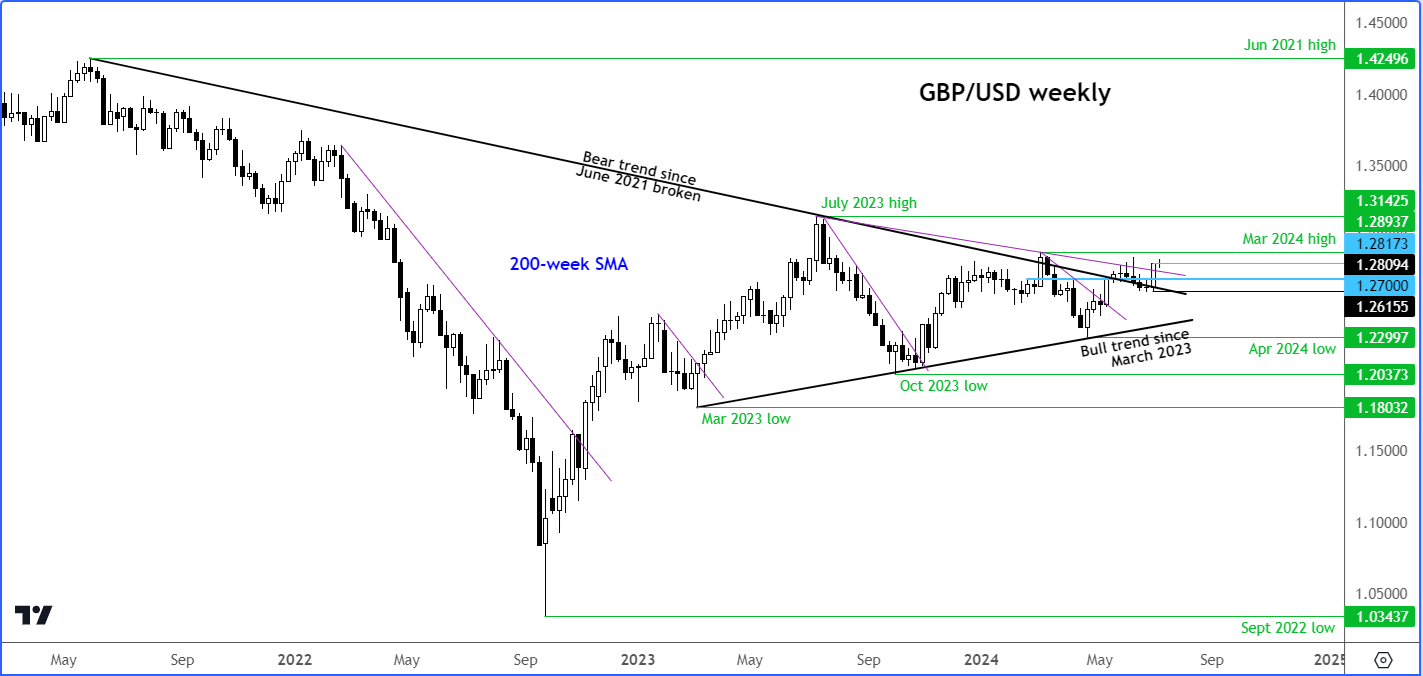Ahead of Thursday’s release of US CPI, the US dollar has been in a holding pattern so far this week after dropping last week following the publication of mostly weaker US data. The weaker dollar last week sent the GBP/USD above the 1.28 handle to end the week solidly in the black, ahead of a busy week for the cable this week.
The upcoming release of US inflation data is likely to alter the odds of a September rate cut in the direction of the surprise, putting the GBP/USD into focus after it surged through a major long-term resistance trend as investors gave Keir Starmer’s progress in his first week as UK Prime Minister the green light. A clearer trend for the US dollar could emerge this week, while will also have some UK data to look forward to. This makes the GBP/USD a key pair to watch this week.
First impressions of new UK PM impress markets
Judging by the relatively calm reaction of the FTSE and the gains for the GBP/USD ever since the handover of the premiership to Labour’s Keir Starmer and the resignation of Rishi Sunak, it looks like political stability is the key takeaway point for UK investors. Of course, a landslide victory was already priced in weeks ago, but the first impressions of Starmer as Prime Minister have undoubtedly pleased his supporters.
Starmer has stated that “the work of change begins immediately”, promising to “rebuild” the country amid widespread public frustration with deteriorating public services, the National Health System and social care, and a faltering economy amid the cost-of-living crisis. Let’s see how he plans to make those changes and whether the market will buy it.
Key UK data to watch this week: GDP and industrial production
Speaking of the economy, we will have the monthly GDP estimate on Thursday in a UK data dump that will provide statistics from May, something Starmer and his Labour party had no say about. In any event, GDP is seen printing 0.2% growth month on month, following a flat April. If GDP or this week’s other UK data beats expectations, and given the calmer reaction to Labour’s victory, the pound could rise further, boosting the GBP/USD.
|
Date |
Time (BST) |
UK data |
Forecast |
Previous |
|
|
|
|
|
|
|
Wed Jul 10 |
2:30pm |
MPC Member Pill Speaks |
|
|
|
4:30pm |
MPC Member Mann Speaks |
|
|
|
|
Thu Jul 11 |
12:01am |
RICS House Price Balance |
-14% |
-17% |
|
7:00am |
GDP m/m |
0.2% |
0.0% |
|
|
|
Construction Output m/m |
0.8% |
-1.4% |
|
|
|
Goods Trade Balance |
-16.1B |
-19.6B |
|
|
|
Index of Services 3m/3m |
1.0% |
0.9% |
|
|
|
Industrial Production m/m |
0.3% |
-0.9% |
|
|
|
Manufacturing Production m/m |
0.3% |
-1.4% |
|
|
9:30am |
BOE Credit Conditions Survey |
|
|
|
|
Tentative |
NIESR GDP Estimate |
|
0.7% |
|
|
2:30pm |
CB Leading Index m/m |
|
-0.1% |
Meanwhile, there are no major US data releases to look forward to today, so Jerome Powell’s second day of testimony is likely to be the main macro event later. The week’s big event is the US CPI data release on Thursday, which might reignite volatility in the FX space.
GBP/USD direction contingent on US CPI
The US dollar will remain in sharp focus throughout the rest of this week, with the publication of the latest CPI and PPI measures of inflation, as well as the University of Michigan’s consumer sentiment and inflation expectations surveys, all coming up on the economic calendar.
Nearly all of last week’s US data disappointed expectations, including Friday's release of the nonfarm jobs report, which showed payrolls rising by 206,000, beating expectations. However, revisions to the prior two months lowered the three-month average to its lowest since January 2021. Unemployment rose to 4.1%, and average hourly earnings grew at the slowest rate since Q2 2021, supporting the Fed's 2% inflation target.
For the rest of this week, we will have the following key US data and Fed members speaking, all having the potential to impact the GBP/USD:
|
Date |
Time (BST) |
US Data |
Forecast |
Previous |
|
|
|
|
|
|
|
Wed Jul 10 |
3:00pm |
Fed Chair Powell Testifies |
|
|
|
6:01pm |
10-y Bond Auction |
|
4.44|2.7 |
|
|
Thu Jul 11 |
1:30pm |
Core CPI m/m |
0.2% |
0.2% |
|
|
CPI m/m |
0.1% |
0.0% |
|
|
|
CPI y/y |
3.1% |
3.3% |
|
|
|
Unemployment Claims |
236K |
238K |
|
|
6:01pm |
30-y Bond Auction |
|
4.40|2.5 |
|
|
Fri Jul 12 |
1:30pm |
Core PPI m/m |
0.1% |
0.0% |
|
|
PPI m/m |
0.1% |
-0.2% |
|
|
3:00pm |
Prelim UoM Consumer Sentiment |
67.0 |
68.2 |
|
|
|
Prelim UoM Inflation Expectations |
|
3.0% |
With upcoming CPI and PPI data, a clearer trend for the US dollar could emerge in the second half of the week, with the greenback so far not showing any downside follow-through after falling across the board last week.
CPI could signal a return to disinflation
The latest Consumer Price Index (CPI) data will be released on Thursday, July 11. Following last month’s print of a weaker-than-expected rise of 0.2% in monthly core CPI and a flat headline reading, US dollar bears had hoped for a larger USD drop last month. However, the dollar held steady against the yen and euro until weak US economic data last week caused a decline. Another weak CPI print could indicate the disinflation process is back on track, helping move inflation toward normal levels.
UoM Consumer Sentiment and Inflation Expectations
Friday’s data releases will include the Producer Price Index (PPI) and the University of Michigan’s Inflation Expectations and Consumer Sentiment surveys. The UoM gauge of consumer sentiment has been declining, consistently disappointing expectations.
Concurrently, several data points like the ISM manufacturing and services PMIs have been weak. The UoM’s Inflation Expectations survey softened to 3.0% from 3.3%. Further declines in inflation expectations could weaken actual inflation through a weaker wage-price spiral.
GBP/USD technical analysis and trade ideas
The longer-term technical outlook on the GBP/USD is turning positive. Indeed, the cable has broken above its bearish trend line that had been in place since June 2021, suggesting rates could be on the verge of a larger move higher, potentially towards the next psychologically important level of 1.3000, last July’s high of 1.3142 or even higher.

Short-term support is seen around 1.2815/20, marking last week’s high, when the pair formed a large thrust candle. Key support is now seen around the 1.2700 handle, which marks the breakout area.
The line in the sand is last week’s low at 1.2615. A potential move back below this level would more or less invalidate the bullish breakout.
Disclaimer: This article is written for informational purposes only; it does not constitute a solicitation, offer, advice, or recommendation to invest as such it is not intended to incentivize the purchase of assets in any way. I would like to remind you that any type of asset, is evaluated from multiple points of view and is highly risky and therefore, any investment decision and the associated risk remains with the investor.
